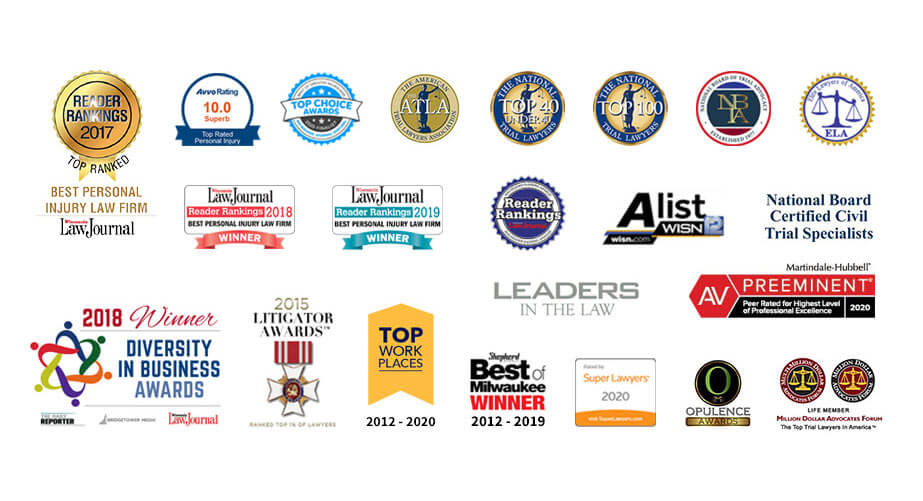Riding a motorcycle involves inherent dangers, and unforeseen accidents may occur. Being prepared can make all the difference in minimizing injuries and ensuring a swift recovery. One of the most crucial preparations any enthusiast can make is assembling a comprehensive motorcycle first aid kit.
Our skilled bike accident lawyer at Hupy and Abraham in Milwaukee—also a longtime rider—explains what essential items to include in a first aid kit to ensure you have what’s necessary in case of unexpected circumstances.
Table of Contents: |
![Contents of a motorcycle first aid kit]() The Importance of a First Aid Kit
The Importance of a First Aid Kit
Motorcycle riding involves exposure to various hazards, including collisions, road debris, and adverse weather conditions. In the event of an accident or injury, immediate medical attention may not be readily available. A well-equipped first aid kit can provide crucial support until professional help arrives or until the rider can seek further medical assistance.
A first aid kit isn't just for the rider's benefit; it can also aid others involved in an accident. According to our Milwaukee bike crash lawyer, by having essential medical supplies on hand, you can potentially assist fellow motorists or bystanders until emergency services arrive, possibly saving lives in critical situations.
Motorcycle First Aid Kit Essentials
When assembling a motorcycle first aid kit, it's important to include items that address common injuries and emergencies encountered on the road. Here are some essential items to consider:
- Bandages and dressings. Various sizes of adhesive bandages, sterile gauze pads, and adhesive tape can be used to cover wounds and control bleeding.
- Antiseptic wipes, alcohol pads, and hand sanitizer. You want items in your kit that can be used to clean wounds and prevent infection.
- Scissors and tweezers. Scissors cut bandages and clothing; tweezers help remove splinters or foreign objects from wounds.
- Sterile gloves. These help protect you from contamination and prevent the spread of infection.
- Instant cold packs. Apply these to reduce swelling and alleviate pain in case of injuries like sprains or bruises.
- Pain relievers. Over-the-counter medications such as ibuprofen or acetaminophen can help manage discomfort.
- Burn cream or gel. Even a dab or two relieves pain and promotes healing for minor burns caused by contact with hot surfaces or fluids.
- Medical supplies specific to riders. You may want to consider including items like a tourniquet or trauma shears for more severe injuries commonly associated with motorcycle accidents.
- Emergency contact information. Include a list of emergency contacts in your first aid kit, including personal, medical, and roadside assistance numbers.
- Glow sticks. These help improve visibility if an injury occurs during a night ride.
- Plastic bags. Dispose of used or contaminated supplies in heavy-duty plastic bags for easy cleanup.
The items in the first aid kit can be used to treat anything from minor scrapes and cuts to more serious injuries while you wait for paramedics to arrive. If you would like to learn more about how to treat injuries at an accident scene, we recommend taking an Accident Scene Management (ASM) course to learn what challenges you may encounter and how to treat them.
What to Do Immediately After a Motorcycle Accident in Milwaukee
In addition to having a well-stocked first aid kit, riders should be prepared to take immediate action following an accident or injury. Some steps to consider include:
- Assess the situation. Stay calm and evaluate the scene for immediate dangers, such as oncoming traffic or fuel spills. Move to a safe location if possible.
- Check for injuries. This includes yourself and others. Prioritize treating any life-threatening conditions, such as severe bleeding or difficulty breathing.
- Call for help. If necessary, dial emergency services or instruct someone else to do so. Provide precise details of the accident's location and the nature of injuries sustained to include in the police report.
- Administer first aid. Use the contents of your first aid kit to provide immediate care to injured parties. Priorities include stopping bleeding, stabilizing injuries, and maintaining airway clearance.
- Document the accident. Take photographs of the scene, including vehicle damage, road conditions, and relevant details. This information may be crucial for insurance claims or legal proceedings.
- Exchange information. Obtain contact and insurance details from other involved parties. Cooperate with law enforcement and emergency responders as needed.
- Seek medical attention. Even if injuries seem minor, it’s vital to have a thorough medical evaluation following an accident. Some injuries may not appear immediately but could worsen without proper treatment.
- Call a Milwaukee bike crash lawyer. Consulting a skilled motorcycle accident attorney at Hupy and Abraham helps protect your legal rights.
Contact Our Proven Milwaukee Bike Crash Lawyer
If you or a loved one were injured in a motorcycle accident, contact our proven Milwaukee bike crash lawyer at Hupy and Abraham. We offer a complimentary, no-obligation consultation to review your case.
To request a confidential appointment, please fill out our convenient contact form by clicking the button above or for immediate assistance, call us at 800-800-5678.

 The Importance of a First Aid Kit
The Importance of a First Aid Kit.png)

